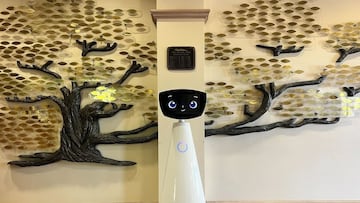Meet Robin, the robotic friend powered by AI that helps children through hospital care
Hospitals and nursing homes in four states are using a childlike robot to entertain patients and help overworked health care staff.


Health care facilities in the United States are turning to artificial intelligence to help children and the elderly combat stress and loneliness during hospital stays.
Robin arrives in hospitals and nursing homes
Thirty centers, a mix of pediatric hospital units and nursing facilities, in California, Massachusetts, New York and Indiana have deployed Robin, an AI-powered therapeutic robot designed to sound and act like a 7-year-old girl. The goal is to take patients’ minds off their ailments.
Launched five years ago by Expper Technologies, Robin performs about 30% of its tasks autonomously, while the remaining 70% is handled by remote operators. Clinical staff also keep a close watch to ensure safe interactions.
Learning with every interaction
Each patient interaction allows Robin to collect more data and learn new behaviors, bringing it closer to full independence, according to Karen Khachikyan, CEO of Expper Technologies.
Robin has a triangular frame and a large screen displaying cartoonlike facial features. It boosts morale by playing games, putting on favorite music, telling jokes or simply remembering patients’ names.
“She brings joy to everyone,” explained Samantha da Silva, a speech language pathologist at HealthBridge Children’s Hospital in Orange County, California. “She walks down the halls, everyone loves to chat with her, say hello.”
Future medical support
The company hopes Robin will soon be able to assist with basic medical tasks, such as measuring vital signs and sending information to doctors and nurses. The long-term goal is for the robot to help older patients with activities such as changing clothes and using the bathroom.
Addressing a growing health care shortage
The Association of American Medical Colleges projects a shortage of 86,000 physicians in the United States over the next 11 years. That shortage could make robots like Robin increasingly valuable in hospitals and care facilities.
“Nurses and medical staff are really overworked, under a lot of pressure, and unfortunately, a lot of times they don’t have capacity to provide engagement and connection to patients,” Khachikyan said. “Robin helps to alleviate that part from them.”
Related stories
Get your game on! Whether you’re into NFL touchdowns, NBA buzzer-beaters, world-class soccer goals, or MLB home runs, our app has it all.
Dive into live coverage, expert insights, breaking news, exclusive videos, and more – plus, stay updated on the latest in current affairs and entertainment. Download now for all-access coverage, right at your fingertips – anytime, anywhere.
Complete your personal details to comment